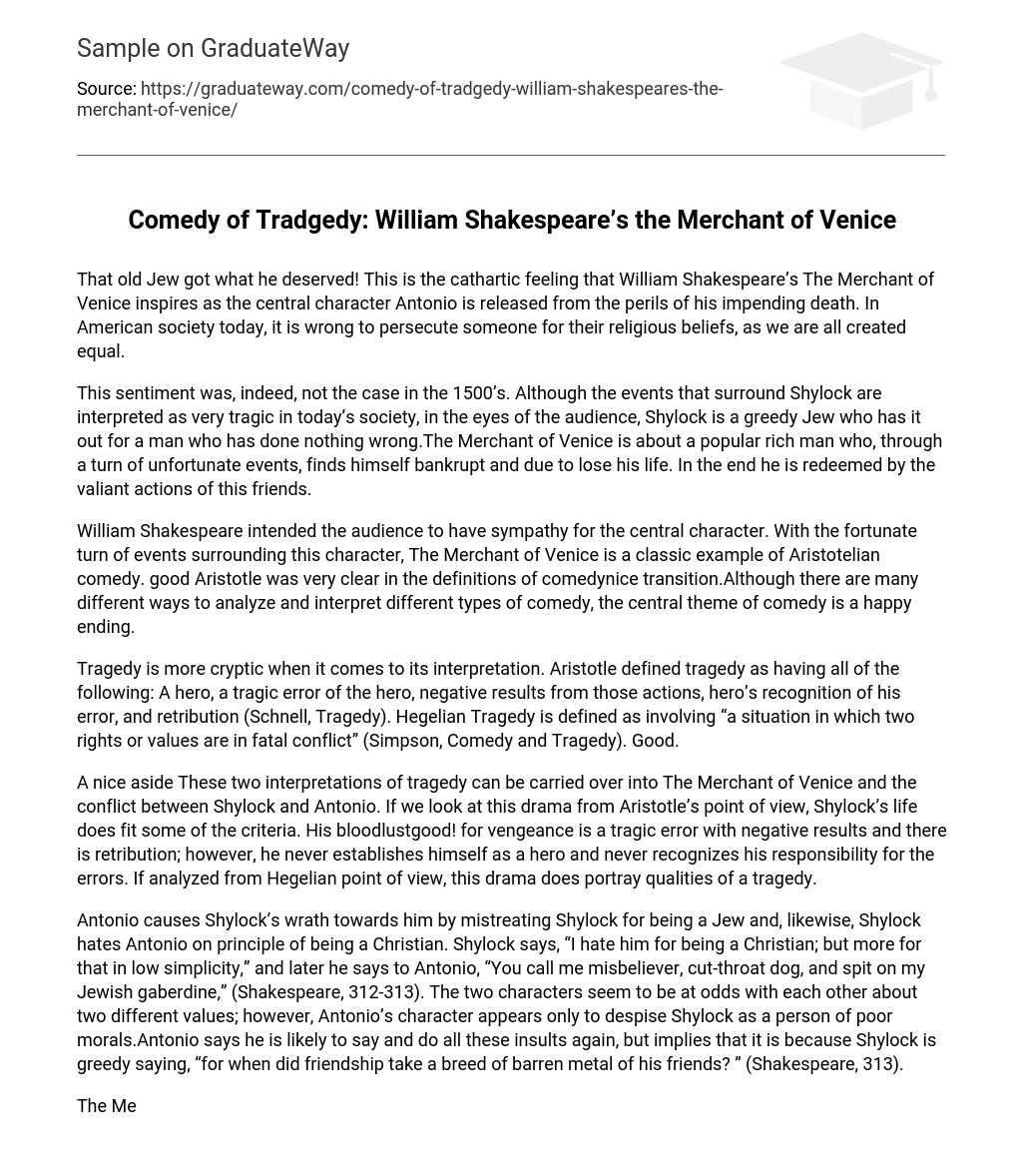In William Shakespeare’s The Merchant of Venice, Antonio is saved from death, giving him a sense of release and implying that the old Jew received deserved punishment. Present-day American society deems it unfair to discriminate based on religious beliefs as we are all equal.
In the 1500’s, Shylock was seen as a covetous Jew with malevolent intentions towards an innocent man in The Merchant of Venice. However, the play portrays a story of a prosperous man on the brink of bankruptcy and potential death, whose friends’ courageous actions ultimately save him from his predicament.
William Shakespeare’s goal in The Merchant of Venice was to elicit sympathy from the audience for the main character. The fortunate events that occur around this character demonstrate the play as a perfect illustration of Aristotelian comedy. In accordance with Aristotle, comedy centers on a central theme of a happy conclusion, and there are various methods to examine and understand different comedic styles.
Tragedy is difficult to interpret, according to Aristotle. He defined tragedy as consisting of several essential elements: a hero, a tragic mistake made by the hero, negative consequences resulting from these actions, the hero’s realization of his mistake, and retribution. On the other hand, Hegelian Tragedy is described as a scenario where two rights or values are in a deadly conflict. This definition was provided by Simpson in his work on comedy and tragedy.
A nice aside These two interpretations of tragedy can be applied to The Merchant of Venice and the conflict between Shylock and Antonio. Shylock’s desire for vengeance is a tragic mistake with negative consequences, satisfying Aristotle’s criteria. However, he never becomes a hero or acknowledges his role in the errors. From a Hegelian perspective, this drama does exhibit characteristics of a tragedy.
The mistreatment of Shylock, a Jew, by Antonio causes his anger towards him, just as Shylock’s hatred towards Antonio is based on his Christianity. Shylock expresses his dislike for Antonio by stating, “I hate him for being a Christian; but more for that in low simplicity,” and later accuses him of calling him derogatory names and spitting on his Jewish attire (Shakespeare, 312-313). While it may seem that these two characters are at odds due to their differing values, Antonio’s disdain for Shylock seems to stem solely from perceiving him as morally corrupt. In response, Antonio implies that he is likely to continue insulting Shylock because of his greediness, asking, “for when did friendship take a breed of barren metal of his friends?” (Shakespeare, 313).
The Merchant of Venice combines elements of tragedy and comedy. Specifically, in this scene, Antonio and Shylock are involved in a tragic dispute caused by their differences. However, the emphasis is placed on the character rather than the conflict itself. Antonio goes to Shylock to ask for a large loan out of his unwavering loyalty towards his friend Bassanio. Despite still being owed by Bassanio, he is willing to risk his life.
This scene introduces Antonio as our comedic hero and the “sympathetic central character” (Simpson, Comedy and Tragedy). According to David L. Simpson, Aristotelian comedy is “a tale of the protagonist’s fortunate improvement” (Simpson, Comedy and Tragedy).
Antonio, a man of wealth and many devoted friends, faces a dilemma when he puts everything on the line – even his own life – to assist his friend Bassanio. Fortunately, with the support of his friends, Antonio is ultimately rescued from this grave predicament. In the end, all conflicts are resolved except for some ongoing amusing marital disputes.
Despite the unfortunate circumstances faced by the Jewish man, this play ultimately triumphs over adversity. With the exception of Shylock, every character in the story finds some sort of resolution to their conflicts. The Merchant of Venice features a comedic hero who overcomes challenges and concludes with a remarkably joyful ending, making it a prime example of a classic Aristotelian comedy.





